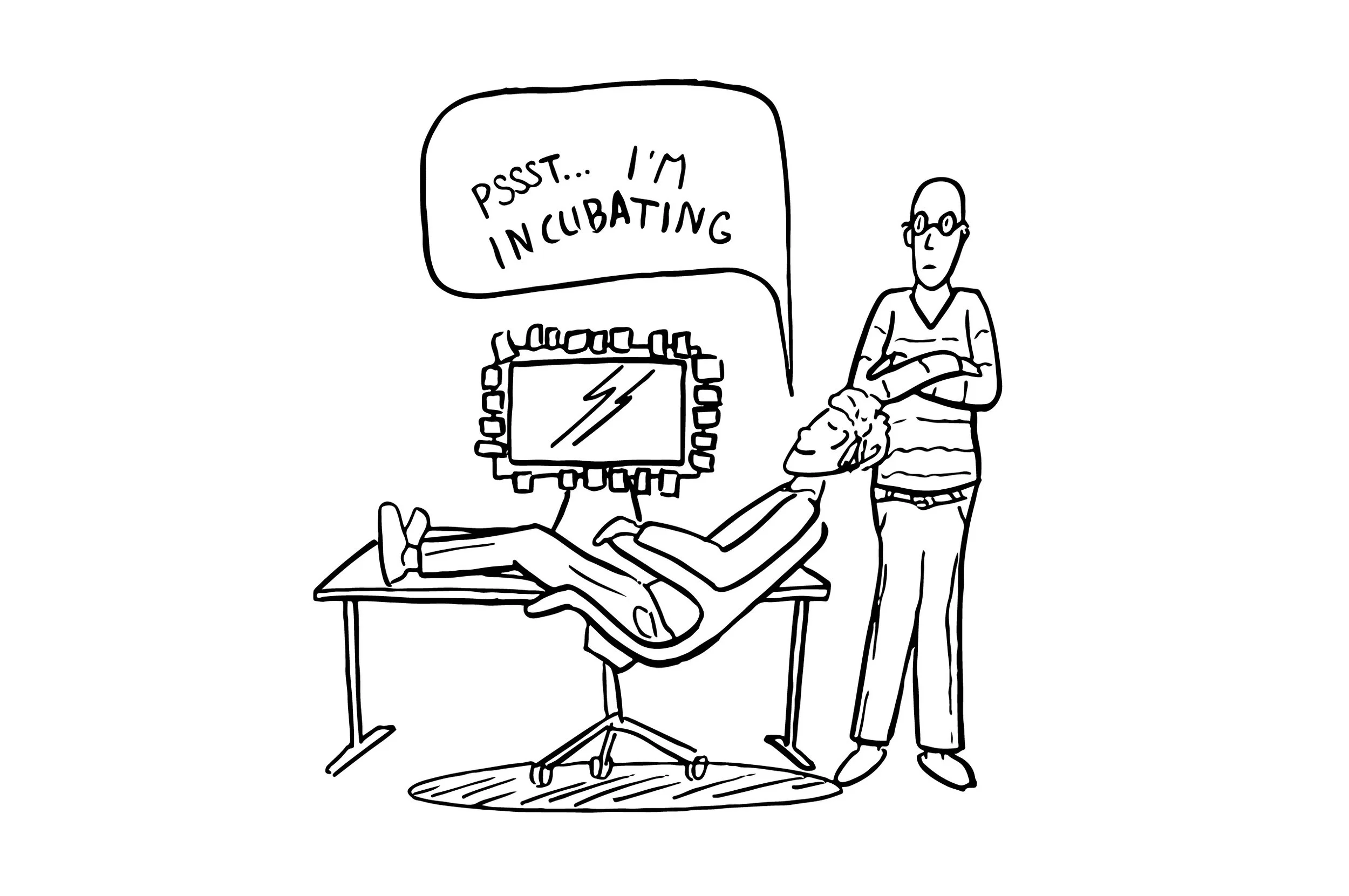Take advantage of the ‘Deliberation-Without-Attention’ effect and create your own eureka moments
Image credit: Blik
The Loo: A muse?
Picture this: You sit on the toilet thinking about nothing in particular, just enjoying a moment of peace without talking to a colleague or staring at a screen. Maybe it is one of those rare moments where, despite having nothing better to do in the bathroom, you’ve finally put away your phone for a moment and found it weirdly relaxing to do so. Then, (boom!) it hit you. Seemingly completely out of nowhere, you got an idea. A really good one. The kind that solved a problem, that you’ve been kicking around for ages without finding a solution. Sound familiar?
This phenomenon, called the Deliberation-Without-Attention effect, has led to a wealth of notepads littering places in which we tend to have those unexpected strikes of lightning: The cluttered dashboard of a car, the narrow gap between two books on a bedside table, the inner pocket of a rugged leather jacket, the side pocket in a cabin trolley, and — yes — the magazine stand next to the loo. What these places have in common, is that they are not particularly conducive to actually doing very much as far as productivity goes. I have certainly solved some big life questions during an aimless walk through Hyde Park or Hempstead Heath, and reached for the notepad in my jacked to jot my epiphanies down.
“All truly great thoughts are conceived while walking.” — Friedrich Nietzsche, Twilight of the Idols (1889)
This much should not be news to anyone, but have you ever considered to strategically take advantage of this effect?
A Manual to Eureka
If you want to know exactly how this works, read this book or this research article. In summary, as you try to solve a problem through conventional ways, such as thinking, gathering information, conversing with others, experimenting and testing hypotheses, your brain works somewhat as a sponge, taking in as much information as it can. During this time, is is pretty busy with your conscious efforts.
Once you stop, the magic happens: Your grey matter won’t just waste that time sitting idle. Instead, and without you knowing it, it starts to process some of the soaked up information, building connections, trying combinations (This period is referred to by psychologists as incubation). Then, whenever it thinks it has something good and you’re not too busy with anything else, it brings it to the surface of your thinking, seemingly at the most random of times. A new idea is born.
From this, you can start to guess what you can actively do to have more of those eureka moments.
Start as usual. Think about your hard problem. Explore it from every angle you can think of. Do your research. If it turns out that your problem isn’t all that hard and you find a solution during this phase, that’s even better. You are done.
If not, don’t force it. Actually, try to forget about it. Do something else. What sounds simple, is actually quite challenging in real life where we expect to always do and solve everything in the moment. However, if your work requires you to deal with multiple projects or work streams, you can learn to build incubation periods into your planning and switch tasks accordingly. In fact, according to this HBR article, the most “…effective way to incubate a problem in need of a eureka moment is to switch to an unrelated, but still work-related, task.”
Relax your mind. Over a period of time (for me that’s often around a week from when I feel like not getting any further with my problem through conventional means), keep putting yourself in situations in which you are not doing anything that requires too much of your attention. Seek places where you won’t be distracted. Go running or for long walks, browse shop windows, sit in a cafe and watch the people passing by, better still, have a shower. Long flights without wifi are great too. Being outside or passing your time this way helps, but when I’m really dedicated I might just sit at my desk at home (I don’t recommend doing this at your place of employment), legs up, and ponder. Maybe you already block out time in your calendar, when you are really serious about getting stuff done, and call it something like ‘heads down time’? Try adding another block: “heads free time”.
Ding ding ding! If you’ve followed steps 1 to 3, and with a little bit of luck, your brain will eventually solve your problem (seriously), or — at the very least — increace your level of creativity when re-engaging in the conscious effort. And really, all you had to do was allow it to chill.
Eureka FAQ
How long to incubate?
Any duration has its own benefits. A study has shown that just a few minutes of working on an unrelated problem can increase your creativity. Longer incubation periods have the added benefit of potentially discovering new crucial information in the meantime.
Anything else to consider?
During your ‘heads free’ time, do not play with your phone. I would argue that this is one of the major downsides that smartphones and the uninterrupted connectedness they provide has brought to us. Less time to not think. Just… give it a break for a bit.
Incubation: Not an excuse to do nothing
This is also not an excuse to differ things for later. You should have a mechanism in place to make sure you revisit your incubated thoughts before you forget about them for good. You may set yourself a reminder, or carry a bullet journal. I, believe it or not, use actual post-its. My colleagues tease me because my screen at work “looks like a sunflower”, but it works for me and the petals do change over time.
What kinds of problems is this method useful for?
I’m a designer and, having to deal with both creative and analytical problems, I find it works for any situation. Sometimes, I have eureka moments about how to fit content on a page in a visually appealing way, and sometimes about what success metrics to track for most meaningful insights. I have used this method for personal investment, as well as career decisions. Primarily, this is for big, difficult problems (as opposed to what you should have for lunch).
Final thoughts
Admittedly, all this certainly requires a level of trust in the subconscious workings of your mind, which seems like a bizarre idea in itself. Just try it when the stakes aren’t too high, until you’ve build the necessary confidence.
I feel like the more I trust in this to work, the more reliable it becomes. Still, every time it feels magical, and — when the lightning strikes — it never fails to make me smile.




















